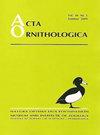比亚沃维耶国家公园原始林斑啄木鸟的觅食行为和性别的关系
IF 1.3
4区 生物学
Q3 ORNITHOLOGY
引用次数: 5
摘要
摘要大斑点啄木鸟Dendrocopos尽管有着广阔的食物生态位,但在觅食时可能更喜欢一些树或树上的地方。雄性和雌性对觅食地点的偏好也不同,这可能会最大限度地减少它们之间的食物竞争。我们研究的主要目标是确定大斑啄木鸟觅食地点的性别特异性用途,该地点位于波兰东部比亚沃维耶国家公园的原始橡树角梁石灰林中。这片森林从未被砍伐过,其特点是具有巨大的垂直和水平多样性的结构,大量的枯木和高大的树木。因此,有大量潜在的觅食地点,一些树木由于其物种或条件,在这方面可能特别受欢迎。我们的研究表明,啄木鸟在树木枯死部位的觅食时间比在活着的部位长,这在雌性啄木鸟身上尤为明显。在挪威云杉(Spruce Picea abies)的尸体上发现了最长的觅食期。雄性在高海拔(高于地面20米)的树的薄部分(直径5-10厘米)觅食时间最长,而雌性在15米以上的地方和树的厚部分(直径10-20厘米)觅食。此外,雌性觅食期的持续时间随着树干直径的增加而增加,这在雄性中没有体现出来。本文章由计算机程序翻译,如有差异,请以英文原文为准。
Foraging Behaviour of the Great Spotted Woodpecker Dendrocopos major in Relation to Sex in Primeval Stands of the Białowieża National Park
Abstract. The Great Spotted Woodpecker Dendrocopos major in spite of its broad food niche may prefer some trees or places on them during foraging. Different preferences for foraging sites can also be found in males and females, which may minimize competition for food between them. The main goal of our study was to define sex-specific use of foraging sites of the Great Spotted Woodpecker, in the primeval oak-hornbeam-lime forest of the Białowieża National Park, E Poland. This forest has never been logged and is distinguished by the structure of great vertical and horizontal diversity, high amount of dead wood and trees which reach large dimensions. Therefore, there are a large number of potential foraging sites, and some trees, due to their species or condition, may be particularly preferred in this respect. Our study revealed that the foraging sessions of woodpeckers were longer on the dead parts of trees than on alive ones which were especially noticeable in the case of females. The longest foraging sessions were found on dead parts of Norway Spruce Picea abies for both sexes. The males foraged the longest at high altitudes (> 20 m above the ground) on thin parts of trees (diameter 5–10 cm) whereas females on sites above 15 m and on thicker parts of tree (diameter 10–20 cm). Moreover, the duration of foraging session of females increased with increasing of trunk diameter at breast height, which was not revealed in males.
求助全文
通过发布文献求助,成功后即可免费获取论文全文。
去求助
来源期刊

Acta Ornithologica
生物-鸟类学
CiteScore
2.10
自引率
0.00%
发文量
14
审稿时长
>12 weeks
期刊介绍:
Publishes scientific papers (original research reports, reviews, short notes, etc.) and announcements from all fields of ornithology. All manuscripts are peer-reviewed.
Established in 1933 as Acta Ornithologica Musei Zoologici Polonici, since 1953 continued under the present title.
Published twice a year by the Natura Optima Dux Foundation under the auspices of the Museum and Institute of Zoology, Polish Academy of Sciences.
 求助内容:
求助内容: 应助结果提醒方式:
应助结果提醒方式:


